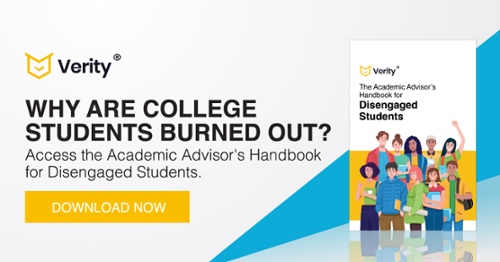Why Students are Dropping Out of College (And What to Do About It)
Why Do Students Drop Out of College?
Unfortunately, the number of students leaving college has grown significantly over the past few years. When coupled with the fact that new student applications are also dwindling across the board, Higher Ed has a real challenge here.
There are many reasons why this is happening, some of which we’ll outline in this blog post. However, it’s important to remember that the decision to enroll in (or drop out of) school is a deeply personal one and the circumstances are different for everyone.
So, why are students dropping out of college?
And, just as importantly, what can institutions do to help students stay enrolled?
The Student Burnout Problem
Burnout among college students has become a growing problem over the past few years, though not enough schools are doing something about it.
We know that college students are already a group with high stress as they balance their busy schedules with classwork, social lives, campus activities, and other responsibilities. The pandemic exacerbated this as students faced a remote learning environment and uncertainty for the future. Even as we return to normal, the challenges continue.
As a society, we’ve done a great job of removing the stigma around mental health. This goes hand in hand with college student burnout which is why schools should be prioritizing mental health.
What You Can Do About It
One of the best things you can do to help your students avoid burnout is to provide support and make sure there are resources available to those who need them. This could be in the academic sense (think: tutors or extra help) or in the mental health sense (think: counselors and mentors).
It’s more important than ever to be empathetic, understanding, and judgment-free. Where possible, encourage your faculty to be graceful and accommodating when it comes to grades and deadlines. Helping students avoid burnout and prioritizing mental health will do wonders for your campus culture.
Many Students Can’t Afford College
Many college students and their families are dealing with financial hardship, especially in the fallout from the pandemic and the current economic challenge we’re all facing.
With this reality, many students are leaving college to work full-time or at least pursue other interests before they take on more college debt.
Students today are reevaluating not just the cost of going to school, but the value of earning a degree. Because many students are burned out or at a loss for direction, they are asking whether the cost of the degree is worth it.
What You Can Do About It
To help, make sure that your students and their families are aware of all tuition reimbursement and financial aid programs that are available to them. There are still financial difficulties that are unavoidable for many students, but need-based forms of financial aid can make a huge impact for those who need it most.
Second, help them understand how valuable education is, not only in the skills that they’ll learn but in the lifetime of opportunities that come with it. Statistically speaking, people with college degrees enjoy higher earning potential and more career opportunities—not to mention a deep sense of fulfillment.
The Uncertain Future
All of the disruption and uncertainty that the last few years have brought were challenging for everyone, but especially for college students who are at such pivotal moments in their lives.
Now more than ever, college students and young people are asking themselves the hard questions:
- What do I really want?
- How will I get there?
- What’s the right path for me?
- Is it worth it?
With so much uncertainty, many students are leaving school to work or pursue other interests while they decide what’s next. If they’re unsure about the value of earning a degree, many of these students may not return to college.
What You Can Do About It
We really encourage schools to help their students with this self-discovery process, both inside the classroom and out. Advocate for them, be a trusted resource and let them know that you care about them as people, not just as students.
One of the best ways to do this is to make sure that you’re preparing your students for life after graduation by helping them learn valuable skills, build resumes, practice interviews, and create relationships with potential employers. This is a process that should begin during their first term and extend through graduation.
And, just as importantly, make sure your students know about it!
They’re Underwhelmed with the College Experience
Students today have higher expectations than ever for the student experience, yet many schools have not kept up with them.
College student engagement is not just about fun events and ice cream socials—though those types of experiences do have their place.
It’s about what the student experience is like when they engage with their school. Do they feel like they’re answering the same questions every time they interact with you? Does communication feel one-sided? Is the Higher Ed CRM they have to use to schedule classes or view their transcript clunky and inefficient? Are you giving students a reason to be excited to return to class the next session?
What You Can Do About It
What people remember most about college are the relationships they create and the bonds they form. What are you doing to help facilitate those?
Take the time to really audit and review the student experience on your campus. Are you asking for feedback? Is the feedback used to create a better student experience? More often than not, you’ll find some low-hanging fruit that you can correct for some easy wins to improve the student experience.
Understanding why students are dropping out of school is a critical first step to addressing that problem. The good news is that this is a solvable problem and something that schools can take active, meaningful steps toward every single day.



